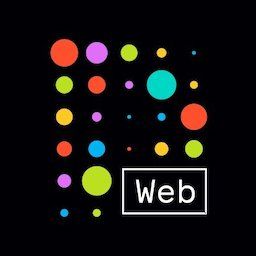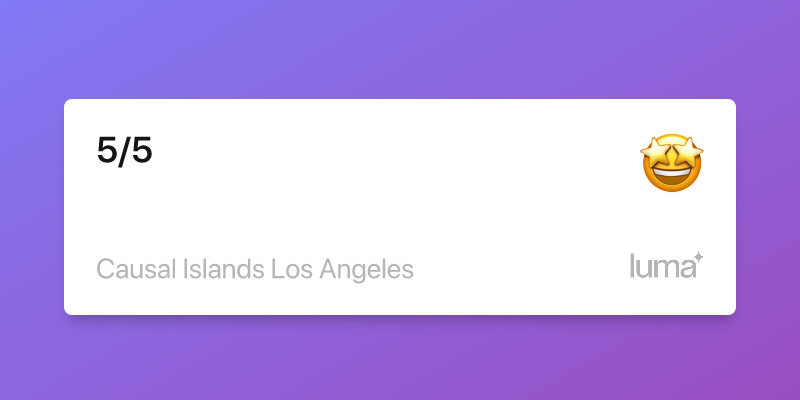In 2023, we hosted the inaugural Causal Islands future of computing conference in Toronto. On Saturday, March 23rd 2024, we had the first "Community Edition", a smaller grass roots one day conference, with presentations as well as room for more unconference style discussions, held in Los Angeles, California.
Causal Islands is about bringing together experts and enthusiasts from many different backgrounds and sharing and learning together. We are creative technologists, researchers, and builders, exploring what the future of computing can be.
The LA community edition had themes of building and running networks together, exploring the future through creativity and poetics of computing, tools for thought and other interfaces for human knowledge, emerging and rethinking social networks, generative AI as a humane tool for people, and the journey of building a more distributed web.

Thank you to Mai Ishikawa Sutton for being a co-organizer of the event, including support as a media partner through DWeb. We hope that many of you will join us at DWeb Camp 2024!
Continue the conversation in the Causal Islands Discord chat »
Sessions
Thank you to all of the presenters and attendees for convening these sessions together! As well as planned talks, we had facilitated discussions on Commons Networks, Decentralized Social, and AI, Truth, & Identity. Below is the list of sessions and presenters with linked presentation resources where available.

Networked Organizing for a Pluriversal Distributed Web
This talk will explore the radical approaches and projects that prioritize solidarity and collective liberation in the creation and maintenance of digital network infrastructure.
Gnosis: The Community-Run Chain
Distinguished by its accessibility for network validation, Gnosis Chain offers a significant departure from Ethereum's 32 ETH requirement for home staking. A single GNO token is all that's needed to validate on Gnosis Chain, making it accessible for home-based validators using standard hardware, inc
Content Addressable Compute with the Everywhere Computer
Boris Mann
An overview of the principles behind the Everywhere Computer, deterministic functions, and verifiable, content addressed compute
The Future of Computing is Fiction
This talk, "The Future of Computing is Fiction", presents a brief overview of Design Fiction and reveals how Design Fiction can serve as an approach for envisioning possible futures of computing. Through the creation of tangible artifacts that imply adjacent possible trajectories for computing's futures, Design Fiction allows us to materialize the intangible, make the non-sensical make sense, and imbue these possibilities with ambitions, desires, and dreams of what-could be. Design Fiction allows us to represent challenges, and technological trajectories in grounded form, through the powerful Design Fiction artifact, such as advertisements, magazines, quick-start guides, FAQs, and news stories. In this talk I will briefly describe the methodologies of Design Fiction and the ways it has been used by organizations, teams, and brands to project into possible futures. I will showcase how speculative artifacts, such as industrial designs for new computing platforms or advertisements for future services, act as conduits for discussion and reflection on the evolution of computing.
https://www.nearfuturelaboratory.com
the poetics of computation
in what ways is a poem a computer? how do the mechanics, the inner working of software, reflect the syntactic and beautiful nature of poetry? this talk dives into the rich history of programmers, poets, writers, and designers and how they've created new worlds with ideas, theories and examples.
Using TiddlyWiki For Personal Knowledge Curation
TiddlyWiki is an open-source software project initiated and maintained by Jeremy Ruston and volunteers since 2004. It is a local-first, future-proof tool for thought, task management system, storage and retrieval device, personal notebook, and so much more.
Spatial Canvases: Towards an 'Integration Domain' for HCl
Going beyond the app for interactive knowledge
Everywhere Computer: decentralized compute
Boris Mann, Brooklyn Zelenka
Join the Fission team in a live, hands on workshop about the Everywhere.Computer.
We'll be walking through how to set up and install a Homestar node, an IPVM protocol reference implementation written in Rust optimized for running WebAssembly (Wasm) functions in workflows. Both data and compute functions are stored on content-addressed networks, loaded over the network, and the results stored for future use.
Towards a topological interchange format for executable notations, hypertext, and spatial canvases.
In this talk we lay out a vision of an interchange format rooted in describing topological relationships and how it underpins distinctly different mediums such as executable notations, hypertext, and spatial canvases.
Our plan to build a Super App for "Everything"
Tech giants struggle to replicate WeChat's success due to regulatory, political, and privacy challenges. We're creating a developer-focused, open-source collaboration platform that ensures end-user data ownership, offline and realtime collaboration, and credible exit.
Intro to Open Canvas Working Group
The Open Canvas Working Group is working to establish a robust file format to enable interoperability between infinite canvas tools.
Building atop Obsidian's JSON Canvas, participants so far include TLdraw, Excalidraw, Stately AI, KinopioClub, DXOS.
See the announcement on Twitter.
Patterns in Data Provenance
A presentation on patterns I encountered as the Data Provenance practice lead at Hypha Worker Co-op, and how our team approached each scenario.
Hallucinating Fast and Slow
Ryan Betts
A series of vignettes retracing one designer's 30 year random walk from QBasic button masher, through Geocities copy-paster, all the way to GPT assisted functional 1x developer — and what that might say about our humane representations of thought, and the seeing spaces not yet achieved.
Farcaster Fever
An overview of the Farcaster protocol, a sufficiently decentralized social network, and its recent growth.
Building The Distributed Web: Trying, failing, trying again
Best practices for building the distributed web in a way that actually works — and a sort of “lessons learned” from the last 5 years or so of not always succeeding. A look at why "the new internet" hasn't taken over yet, despite significant investment, and how we can get there still.
